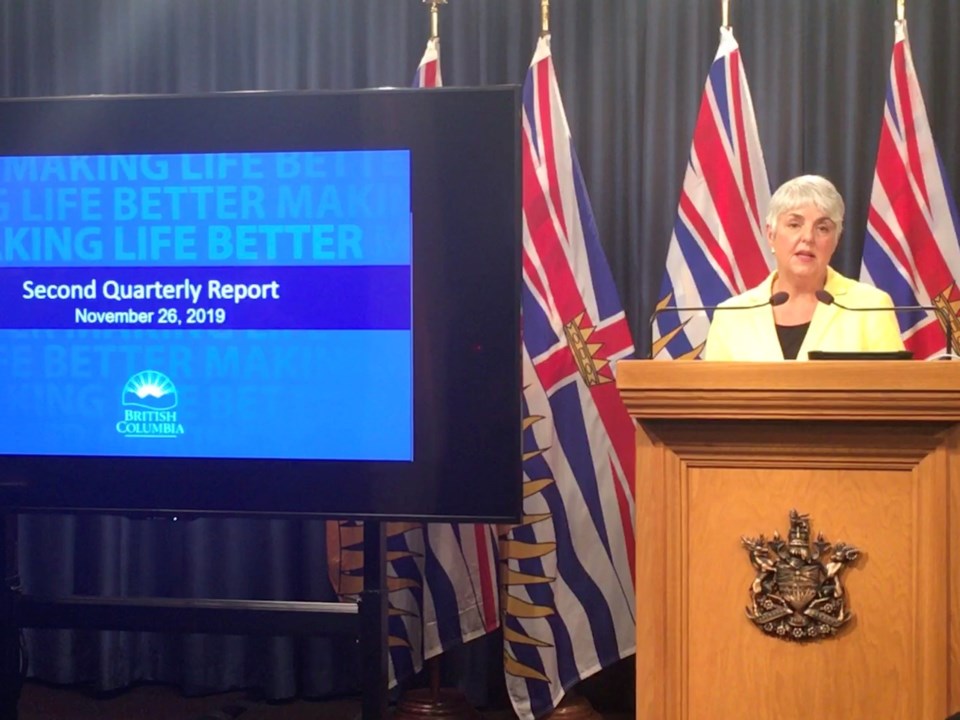Second verse, same as the first.
Finance Minister Carole James’ second quarterly update on the 2019 budget was much like the first: the surplus is smaller, and there are significant risks on the horizon.
First, the surplus itself. It’s now $149 million, down from $179 million in the first quarterly report, and $274 million in February’s budget.
This is consistent with a general downward trend. BC’s surplus has gone from $2.7 billion in 2016-17, to $1.5 billion for 2018-19, and now $149 million. It's a precipitous drop of some $2.5 billion, and this despite adding or increasing some 19 taxes.
Unsurprisingly, the biggest revenue hit in this update comes in forestry. Provincial revenues from the sector are down $133 million since the last update, just four months ago. Natural resource revenues are down almost across the board.
There are other worrisome indicators. Retail sales continue to slow down, showing just 0.6% growth through October 2019. As recently as 2017, it increased 9.3%. Exports are also down 5.7%.
To be sure, there are glimmers of good news. Though it continues to shrivel, the province does indeed still have a surplus. B.C.’s unemployment continues to be low. The Triple-A credit rating, crucial for keeping interest payments low, has been maintained. And in a sluggish Canadian market – no longer buoyed by Alberta – BC looks to lead the country in GDP growth in 2020.
These are good things – but more bad news may be on the horizon.
First, as the BCTF underscored during the NDP’s weekend convention, there’s still no contract with the teachers’ union, and the sides are still very far apart. Asked if the tight surplus means there’s no room to increase the provincial offer, James was definitive:
“The mandate is the mandate,” referring to the provincial government’s mostly successful policy that requires public sector unions to agree to three-year terms, with annual pay hikes of 2% - but that's all. In other words, there’s no more money coming to the table, despite an increasing pressure campaign, which has not yet included labour disruptions. Emphasis on "yet."
Second, ICBC’s ongoing losses will almost certainly create more headaches for James, as the recent BC Supreme Court decision was not factored into this update.
When Attorney General David Eby first introduced the change limiting court experts, it was touted as saving $400 million. Just last week, when he announced the government would not appeal the decision reversing it, Eby again said it would mean a $400 million hit…eventually.
“The impact of the decision is potentially the full $400 million amount back on the books this year. However, our amendments of the evidence act could potentially provide some savings, going forward that would need to be deducted from that. So we're doing the work to determine how much we feel comfortable and that's really not up to us it's how much ICBCs actuaries, and the auditing team, feel comfortable with appropriately claiming in this fiscal year.”
While the government has some very clever accountants (not a criticism), none of that $400 million was claimed in this update, and it will have to be figured in eventually. While Eby hinted more legislative changes were coming (which would also be challenged in court) James said the “worst case scenario” would simply be eating the loss. Interestingly, she increased contingency funds from $400 million to $500 million, which would allow the government to swallow the full $400 million hit to ICBC, and still have some (very) modest wiggle room – but that might have to wait for the third quarterly update.
Finally, the NDP still has a lot of promises to keep, but less and less money to deliver them. Unless Ottawa steps in with more and permanent funding for childcare, for example, the NDP will have no choice but to either scale back their plans, or embrace a deficit. The plan is to plan for more federal funding.
“The government has no more money to pay for the billions of dollars of promises they made $10-a-day childcare, the $400 renter’s rebate, and the elimination of school portables, these are all broken NDP promises,” said BC Liberal finance critic Shirley Bond.
At the very least, the NDP government will likely face some hard choices in the near future. Unless the economy improves dramatically – which their own forecasts say is unlikely – and with several major capital projects still ahead and unfunded, B.C. might be facing deficits again in the near future.
Maclean Kay is Editor-in-Chief of The Orca
SWIM ON:
- Maclean Kay: The first quarterly update showed many of the same trends - a shrinking surplus, and storm clouds on the horizon.
- Rick Cluff sat down with the BC Chamber of Commerce's Val Litwin to discuss the NDP government's 2019 budget.
- The devil lurks in the details, noted Jordan Bateman of the original 2019 budget.



